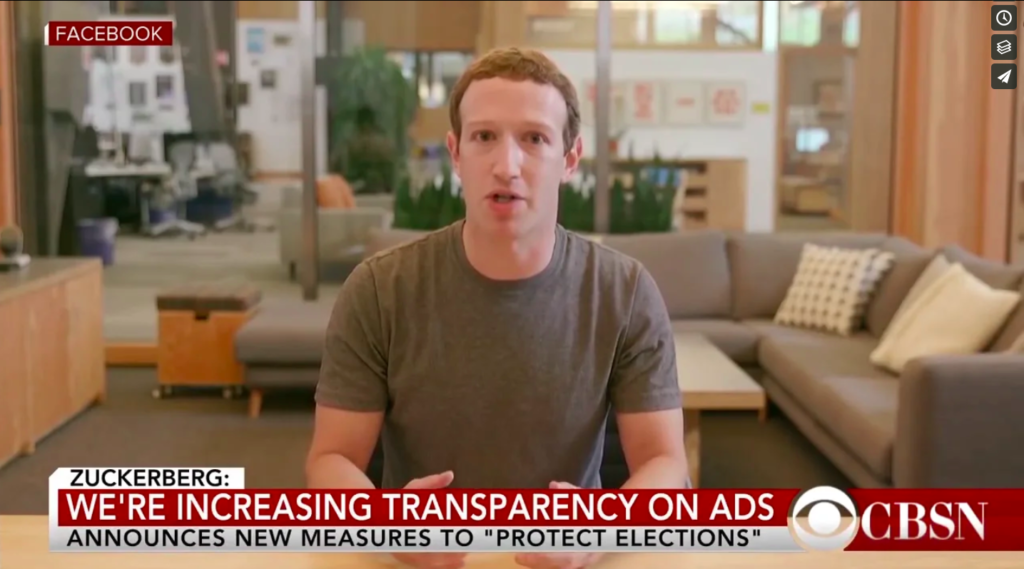Art World
Artists Create a Sinister ‘Deepfake’ of Mark Zuckerberg to Teach Facebook (and the Rest of Us) a Lesson About Digital Propaganda
Bill Posters, who created the work with Daniel Howe, explains the concerns behind the viral art intervention.

Bill Posters, who created the work with Daniel Howe, explains the concerns behind the viral art intervention.

Naomi Rea

“Imagine this for a second,” Mark Zuckerberg intones in a measured voice as a news ticker below him flashes a message about ad transparency on screen. “One man with total control of billions of people’s stolen data, all their secrets, their lives, their futures.” The Facebook CEO goes on to thank a mysterious entity called “Spectre” for showing him that “whoever controls the data, controls the future.”
It’s an unlikely statement coming from the social media mogul who has worked hard to clean his image since his very public grilling in Congress over Facebook’s handling of user information. But that’s because it’s not real. The provocative video is actually a ‘deepfake’ created by artists Bill Posters and Daniel Howe using artificial intelligence.
The faux-Zuckerberg is in good company, as the pair are circulating similarly doctored videos of celebrity influencers from Marina Abramović to Kim Kardashian, all raving about the ominous Spectre.
The work has gone viral, with coverage from the Daily Mail to TechCrunch. “It’s a bit of a shock, to be honest,” the artist tells me of the media attention the project is getting. “But it’s fascinating, and I’m glad to get to engage people in this important conversation about the digital influence industry.”
The videos are part of a conceptual art installation, called Spectre, which was included in a (now-closed) exhibition called “Alternate Realities” at Site Gallery in Sheffield, England. It comprised six black monoliths arranged in a way the artist likens to “a 21st century stone circle,” with touch screen surfaces on which viewers could watch these videos and explore other tactics often used by tech giants, political campaigners, and marketing firms to influence user behavior both on- and offline.
The work was created in response to global scandals about data privacy and influence-peddling such as that concerning Cambridge Analytica, a company that used data mining and analysis to deploy strategic communications to influence people in the run up to both the Brexit vote in the UK and US Presidential elections.
“It is really a philosophical question that we’re asking with regards to privacy and the use of personal data and the safeguards that should exist to protect it,” Posters tells artnet News. “Companies like Facebook, Google, and Amazon have been freely operating in this territory for years, and we are only now seeing the results.”
The powerful installation delivers a cautionary message about the digital influence industry, technology, and democracy. “Spectre is an ambiguous friendly tech giant trying to indoctrinate each visitor into the power and truth of ‘data-ism,’ a religious philosophy that is replacing human liberalism as the defining ideology of our time,” Posters explains.
In the installation, user data is extracted through a game. As visitors swipe up on brands they love and down on brands they hate, a rounded personality profile is created that changes the audience experience of the installation. As users interact with the screens, they are sorted into categories using the OCEAN profiling method, the behavioral psychology tool used by Cambridge Analytica, which can identify users personalities in order to create micro-targeted ads and deliver a hyper-personalized experience. (OCEAN stands for five personality traits: openness, conscientiousness, extraversion, agreeableness, and neuroticism.)

Installation view of Bill Posters and Daniel Howe’s Spectre. Image courtesy the artists.
Many people see deepfake technology as the next big hurdle to be faced when it comes to curbing the spread of fake news online. How social media sites like Facebook decide to handle these types of manipulated videos sets an important precedent. The sinister video of Zuckerberg is going viral, and so far, Facebook has not removed it or any of the other deepfakes published on Posters’s Instagram account.
“We wanted to put them in a position where they really needed to engage more deeply with these types of technologies, and their responsibility to the public,” Posters said. “It will be interesting to see how he feels when it is his information being used by an opaque company. Will it be one rule for Zuckerberg and another for everyone else?”
Posters warns that we are headed into a new frontier where it will be increasingly important to protect our privacy and control how our information is used. “We should be pushing for a digital bill of rights that enshrines these essentially human rights,” he says.
Watch the Zuckerberg video here: